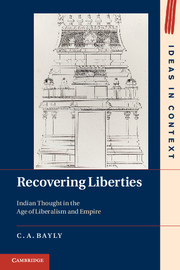Book contents
- Frontmatter
- Contents
- Preface
- Note on Indian names
- Introduction
- Chapter 1 The social and intellectual contexts of early Indian liberalism, c.1780–1840
- Chapter 2 The advent of liberalism in India
- Chapter 3 The advent of liberal thought in India and beyond
- Chapter 4 After Rammohan
- Chapter 5 Living as liberals
- Chapter 6 Thinking as liberals
- Chapter 7 Giants with feet of clay
- Chapter 8 Liberals in the Desh
- Chapter 9 ‘Communitarianism’
- Chapter 10 Inter-war
- Chapter 11 Anti-liberalism, ‘counter-liberalism’ and liberalism’s survival, 1920–1950
- Conclusion
- Glossary
- Select bibliography
- Index
- References
Introduction
the meanings of liberalism in colonial India
Published online by Cambridge University Press: 05 June 2012
- Frontmatter
- Contents
- Preface
- Note on Indian names
- Introduction
- Chapter 1 The social and intellectual contexts of early Indian liberalism, c.1780–1840
- Chapter 2 The advent of liberalism in India
- Chapter 3 The advent of liberal thought in India and beyond
- Chapter 4 After Rammohan
- Chapter 5 Living as liberals
- Chapter 6 Thinking as liberals
- Chapter 7 Giants with feet of clay
- Chapter 8 Liberals in the Desh
- Chapter 9 ‘Communitarianism’
- Chapter 10 Inter-war
- Chapter 11 Anti-liberalism, ‘counter-liberalism’ and liberalism’s survival, 1920–1950
- Conclusion
- Glossary
- Select bibliography
- Index
- References
Summary
This book is a study of some central themes of Indian political and social thought from the last critical stages of the British invasion of the subcontinent during the 1810s and 1820s to the time of the nationalist campaigns against colonial rule in the 1930s and 1940s. Its focus is a wide range of arguments and practices which can broadly be called ‘liberal’, though it necessarily also touches on the ideas of some of those who criticised ‘liberalism’, or even rejected it outright, in favour of loyalty to the British Raj, mass action and violence against it or, later, Indian versions of communism. Indian liberal ideas, I argue, were foundational to all forms of Indian nationalism and the country’s modern politics. Yet Indian liberalism was both wider in scope, and more specific in its remedies, than what is commonly called nationalism.
To put it in its most positive light, Indian liberalism represented a broad and internally contested range of thought and practice directed to the pursuit of political and social liberty. Its common features were a desire to re-empower India’s people with personal freedom in the face of the despotic government of foreigners, embodied traditional authority and supposedly corrupt domestic or religious practices. Indian liberals sought representation in government service, on grand juries and, later, on elective bodies. They demanded a free press, freedom of assembly and public comment. Again, liberals broadly accepted the principle of individual property rights, subject, in principle at least, to various degrees of protection for the masses against economic exploitation. Liberals emphasised education, particularly women’s education. Educated women would help to abolish domestic tyranny, reinstate the ancient Hindu ideal of companionate marriage and improve the race. But a fine line was to be drawn between instructing women and permitting excessive licence in gender relations, which was seen as a Western corruption.
- Type
- Chapter
- Information
- Recovering LibertiesIndian Thought in the Age of Liberalism and Empire, pp. 1 - 25Publisher: Cambridge University PressPrint publication year: 2011
References
- 11
- Cited by

